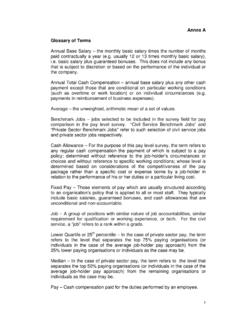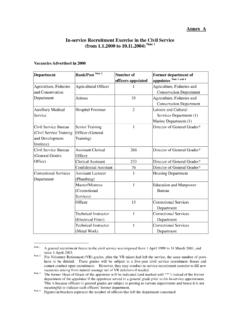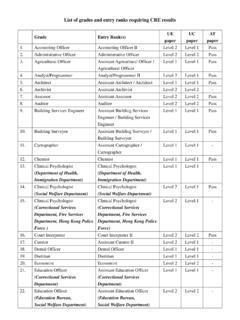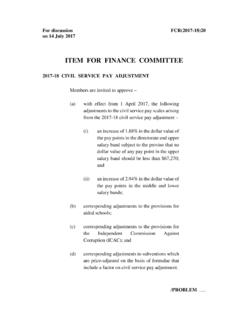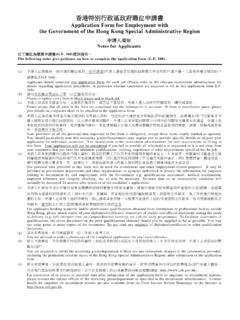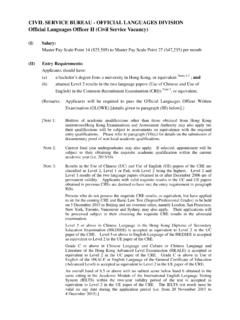Transcription of For information - csb.gov.hk
1 LC Paper No. CB(1)1979/03-04(01). For information LEGISLATIVE COUNCIL PANEL ON PUBLIC SERVICE. Review of Acting Allowance PURPOSE. At the meeting of the Panel on Public Service held on 16 February 2004 when the subject of review of acting allowance was discussed, Members noted that the proposals contained in LC Paper No. CB(1)966/03-04(03) were put to the staff sides and departmental management for consultation in parallel. In response to Members'request, this paper sets out the outcome of the consultation. OUTCOME OF THE CONSULTATION. 2. We have consulted the staff sides and departmental management on the proposed revisions to the rates of acting allowance and other administrative arrangements as detailed in the above panel paper. 3. The general feedback of the staff sides is that they object to the proposed reduction of the rates of acting allowance by roughly 10% across-the-board. In particular, they are concerned about the effect of the reduced rates on long-term acting appointments which are arranged to test an officer 's suitability for substantive promotion, to fill time-limited posts or as an interim arrangement due to uncertain service needs.
2 4. On the other hand, departmental management in general appreciate the rationale of the proposed revisions to the rates of acting allowance given the need to reduce Government 's operating expenditure. Similar to the staff sides, some of them have concerns on possible management or operational problems arising from the proposed reduction in the rate of allowance for acting-up cases, particularly for those long-term acting appointments specifically arranged to test officers'suitability for substantive promotion or to fill time-limited posts. Some also pointed out that due to specific operational needs, there may be occasions where more than two -tier acting appointments would need to be arranged. OUR VIEW. 5. We have carefully considered the comments received. Given the Administration's commitment to achieving economy in Government's operating - 2 - expenditure, we remain of the view that there is a case to make adjustments to the acting allowance as part of the concerted effort of the civil service to help reduce operating expenditure and that the proposed revisions are in general appropriate.
3 That said, we consider that the concerns of both the staff sides and departmental management on long-term acting-up cases are not unreasonable since these officers are asked to take up the acting-up arrangements for a prolonged period of time, which could last for over a year. Indeed, if the post is filled by a substantive officer at the rank, he/she would have received the full remuneration package of that post. Balancing this concern on the one hand and the need to reduce Government's operating expenditure on the other, we have refined our proposal in respect of acting-up allowance. In cases of continued acting-up arrangement lasting longer than 180 days and where the officer concerned is selected to act-up through a promotion or selection exercise, the acting allowance will be 90% of the difference between the minimum pay of the acting office and the substantive pay of the officer concerned for the first 180 days, increasing to 100% of the difference after the first 180 calendar days of acting.
4 We believe that the above refinement has struck the right balance and should address the concerns of all relevant parties. For Members'. ease of reference, the refined rates of acting allowance are listed at Annex. 6. For other acting appointments arranged to cover the temporary absence of the substantive officer and on which no prior promotion or selection exercise is arranged, the rates of acting allowance would remain as those proposed in LC Paper No. CB(1)966/03-04(03). As highlighted in the panel paper, we would ask departments to enhance vigilance and review such temporary acting arrangements on a quarterly basis to ensure that there is indeed continued need for the acting arrangements. If there is long-term service need for the posts concerned, departments shoul d seek to fill them on a substantive basis instead of asking officers to act in the posts on a prolonged basis. 7. For the other administrative arrangements detailed in the earlier panel paper, we consider them appropriate in general and do not consider it necessary to introduce any changes.
5 WAY FORWARD. 8. We have advised the staff sides and departmental management on the changes and promulgated the revised arrangements on 24 May 2004. The revised arrangements will be implemented with effect from 1 July 2004. Civil Service Bureau May 2004. Annex Revised rates of acting allowance Types Acting Office Acting Allowance Existing rates Revised rates (a) Acting-up All 100% of the difference 90% of the difference in in pay between the pay between the minimum minimum pay of the pay of the acting office and acting office and the substantive pay of the substantive pay of the officer concerned officer concerned For those officers who are identified to take up acting-up appointments in a promotion or selection exercise, the rate will be revised to 100% of the difference after the first 180. calendar days of acting. (b) Doubling- Directorate 110% of the difference 100% of the difference in up in pay between the pay between the minimum minimum pay of the pay of the acting office and acting office and the substantive pay of the officer substantive pay of the concerned officer concerned Non-directorate 1/4 of the minimum 23% of the minimum pay of pay of the acting office the acting office or 100% of or the acting-up rate, the difference in pay whichever is the more between the minimum pay of the acting office and substantive pay of the officer concerned, whichever is more.
6 Doubling- Permanent Sideways Secretaries and (c) Heads of Departments posts Others 1/6 of the minimum 15% of the minimum pay of pay of the acting office the acting office. (d) Doubling- No acting allowance. dow
